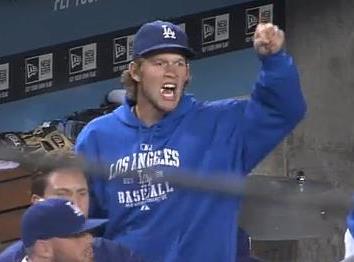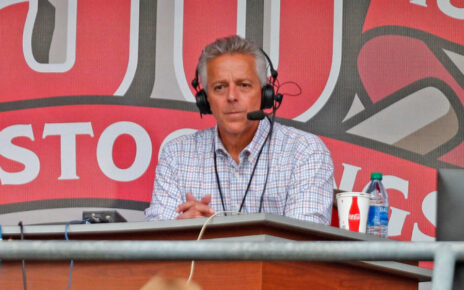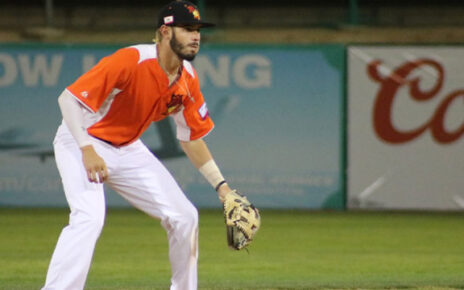Baseball, specifically the game as it is played in America, is an odd duck when it comes to emotions. People want ballplayers to show that they care, but they also want them to go about their business. It’s important to fans that big moments are celebrated, but only in an amount and manner that is appropriate. Anger is okay, or maybe it’s not. How we choose to react to the emotions conveyed by ballplayers tells a better story than the emotions themselves.
While perusing Twitter this issue was brought to the forefront by a clip of Clayton Kershaw getting mad. In the short
It’s very clear watching the clip that in every incident Kershaw is acting like a misbehaving child. He throws a few different tantrums, decides to use a baseball as a weapon because the night before Gerardo Parra had celebrated a home run against the Dodgers, and he argues with umpires and his own manager like a toddler who isn’t getting his way. The replies to the clip, for the most part, see none of this, rather they see an attack on a player giving his all. In this case, emotion is okay, and in the clip itself, the various announcers treat Kershaw’s outbursts as if they are expected and perfectly acceptable behavior.
Another player is oft mentioned in the replies, the Padres new all-star third bagger, Manny Machado. Machado has had a few incidents of his own where he let his emotions get the better of him. He used a bat as a weapon against another player, he has thrown tantrums on the field, and he has argued with umpires and his own manager. Machado is no saint, but he is vilified for his emotion while Kershaw is not. Search out any clip of Machado showing emotion and the announcing that accompanies the clip almost always paints Machado as the bad guy. This is never true for Kershaw, and just like with the replies to the Kershaw clip, we all know why.
It’s okay, according to most baseball fans, for Kershaw to show emotion. He can get angry, throw tantrums, act like a baby, and attempt to hurt or maim a fellow player with a baseball because he’s just showing fire. The same actions by Machado do not produce the same reaction from fans, and the simple reason is that Kershaw is white while Machado is not. Being Latino shouldn’t be a reason for Machado to be treated differently. His otherness should be a valuable part of who he is, not a reason to denigrate his emotions while celebrating similar emotions from a white player. Yet, it is, and these two players aren’t isolated. This sort of race or skin color based reaction has been seen in numerous interactions involving numerous players throughout the years.
Social media exists now, and that is the main factor in the more fervent acknowledgment of the racism on display. The evidence is right in front of our eyes, even if we don’t want to admit it is present. I can search YouTube for other clips of Kershaw temper tantrums, and read the responses. Then I can do the same with an incident involving Machado, and all the evidence of different treatment is right in front of my eyes. I can look to how the potential free agency of Kershaw was handled versus the actual free agency of Machado. The stories written about Kershaw didn’t touch on his volatile nature or his penchant for throwing temper tantrums. You better believe the opposite was true for Machado. In fact, a good drinking game could be made for baseball writers during his free agency making mention of Machado being a dirty or emotional player. You’d wind up dead halfway through the first article, but rules are rules.
Manny Machado is an excellent baseball player, and so is Clayton Kershaw. Both are prone to bouts of high emotion on the baseball field. One is considered emotional for his bouts, while the other is a gamer. To be clear, outside of throwing baseballs or bats at players, I’m fine with emotion. I want players to be emotional, to show that they care, and to celebrate when they do amazing things on the diamond. I could do with a little less of Kershaw acting like a 3-year-old upset that he lost his pacifier and a wee more of Machado acting like his latest home run is the greatest thing ever. Still, emotion does not bother me.
What does bother me is knowing that players of color are being treated differently for displaying the same emotion as white players. Fans, writers, and anyone who comments on baseball needs to do better and be better when it comes to how we treat players in these situations. Even if you don’t see it, we’ve heard enough interviews with non-white players to know that they see and feel the racism in the reactions towards their displays of emotions. The racism double standard in how we talk about and address displays of emotion on the baseball field can be easily fixed. Of course, that requires that everyone acknowledge there is a problem. I have a feeling I’m going to be waiting a long time for that to happen.
Lead photo courtesy of Bill Clayton – Associated Press




